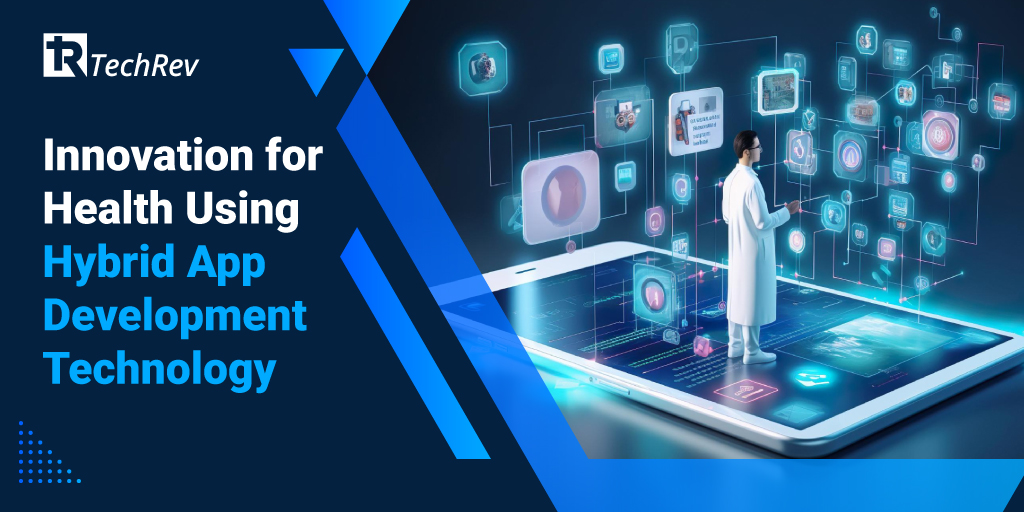
In the dynamic intersection of technology and healthcare, hybrid app development emerges as a transformative force, simplifying business processes and expanding global reach. The exponential surge in hybrid app development, marked by a notable increase, underscores its pivotal role in revolutionizing the health sector. This blog explores the innovative strides made in “Innovation for Health Using Hybrid App Development Technology,” unraveling the ways in which these applications are streamlining operations, fostering accessibility, and shaping the future of healthcare on a global scale.
What is Hybrid App Development?
Hybrid App Development seamlessly blends the best of both worlds, combining elements of native and web applications. These versatile applications are built using web technologies (HTML, CSS, JavaScript) but run within a native container, offering cross-platform compatibility. In the healthcare sector, the advantages are paramount—cost-effectiveness, broader audience reach, and a unified user experience, fostering innovation and efficiency in delivering medical services.
Or You Can Say…
Hybrid apps combine web and native elements, utilizing web technologies like HTML, CSS, and JavaScript within a native shell. This amalgamation allows developers to create cross-platform applications, ensuring a unified codebase for different operating systems. The result is a cost-effective and efficient solution with the benefits of both web and native app development.
Advantages of Hybrid App Development in the Healthcare Sector
- Hybrid apps offer budget-friendly development, optimizing healthcare technology investments.
- Reach patients seamlessly on various devices, fostering wider healthcare accessibility.
- Efficiently manage health information with unified hybrid app solutions.
- Elevate patient experiences through intuitive interfaces and consistent performance.
- Ensure timely integration of new features and security patches for improved healthcare services.
Current Landscape of Health Technology
The current landscape of health technology is evolving rapidly, with a growing emphasis on digital solutions. To enhance health services, implementing hybrid app development is imperative. Seemingly, it is bridging gaps, offering cross-platform compatibility for wider accessibility.
The integration is letting healthcare providers streamlining their processes, improving patient engagement, and staying agile in adopting future technologies.
This fusion of health technology and hybrid app development is key to delivering efficient and patient-centric services in the dynamic healthcare ecosystem.
Role of Hybrid Apps in Addressing Healthcare Challenges
Challenge: Fragmented Data Access
Disparate health data sources hinder comprehensive patient insights.
- Hybrid App Solution: Unified data access ensures seamless integration, offering a holistic view of patient information for informed decision-making.
Challenge: Platform Diversity
Diverse devices complicate healthcare app development.
- Hybrid App Solution: Cross-platform compatibility ensures consistent performance on various devices, reducing development complexities.
Challenge: Limited Accessibility
Geographic barriers restrict healthcare access.
- Hybrid App Solution: Wide-reaching accessibility facilitates remote patient monitoring and telehealth services, breaking down geographical constraints.
Challenge: Data Security Concerns
Patient data vulnerability poses a significant risk.
- Hybrid App Solution: Stringent security measures, including encrypted data transmission, fortify hybrid apps against potential breaches.
Challenge: Slow Adoption of New Technologies
Reluctance in adopting innovative healthcare technologies.
- Hybrid App Solution: Incremental adoption allows for seamless integration of new features and technologies, ensuring a smooth transition for healthcare providers and users.
Encouraging collaboration for future advancements is pivotal in fostering a synergy between healthcare professionals and technology experts. By bridging the gap, we can collectively propel innovation in medical services, ensuring that emerging technologies such as hybrid app development continue to enhance patient care and reshape the future of healthcare delivery.
Call to Action for Developers and Healthcare Stakeholders
In this pivotal moment of technological convergence and healthcare evolution, a compelling call to action resonates with both developers and healthcare stakeholders. Developers are urged to harness the power of hybrid app development, creating innovative solutions that transcend traditional healthcare boundaries. Simultaneously, healthcare stakeholders are invited to embrace these transformative tools, recognizing their potential to revolutionize patient care, streamline operations, and enhance accessibility.
This collaborative effort ensures that as we move forward, the collective commitment to adopting hybrid apps becomes the driving force in building a resilient and patient-centric healthcare ecosystem for the future.
